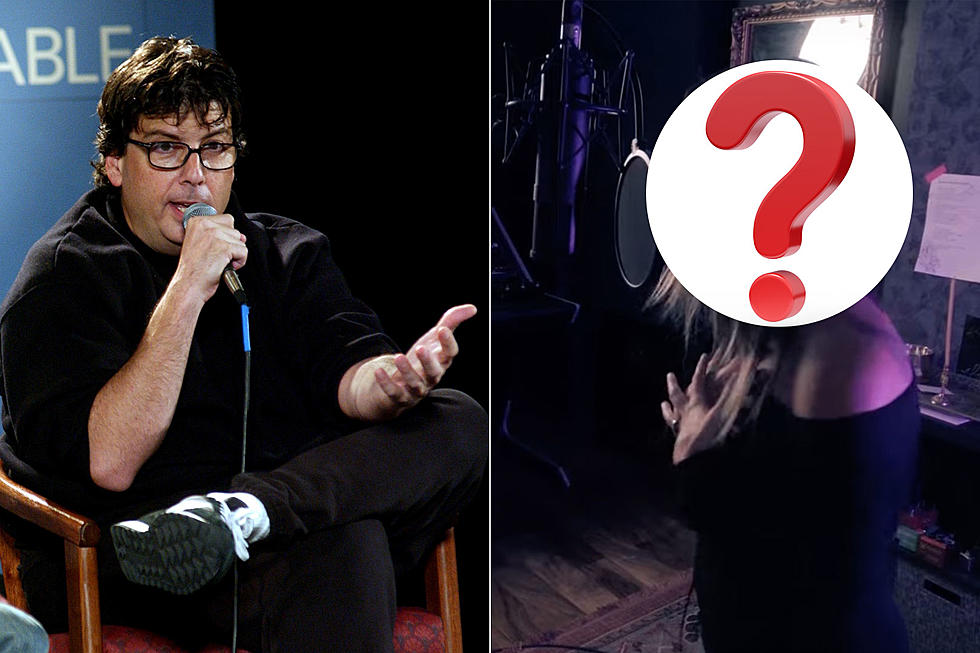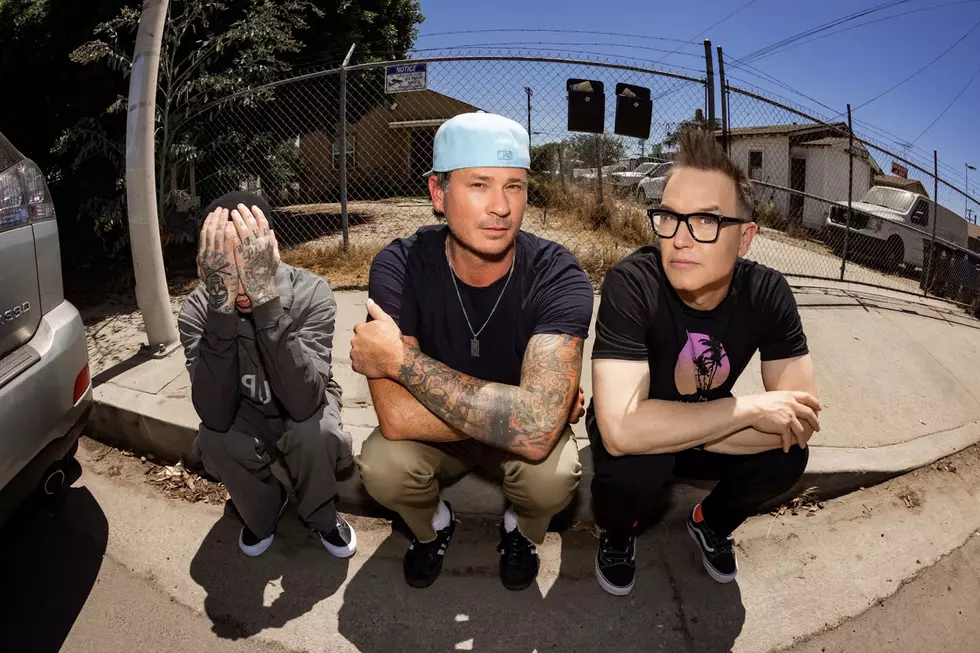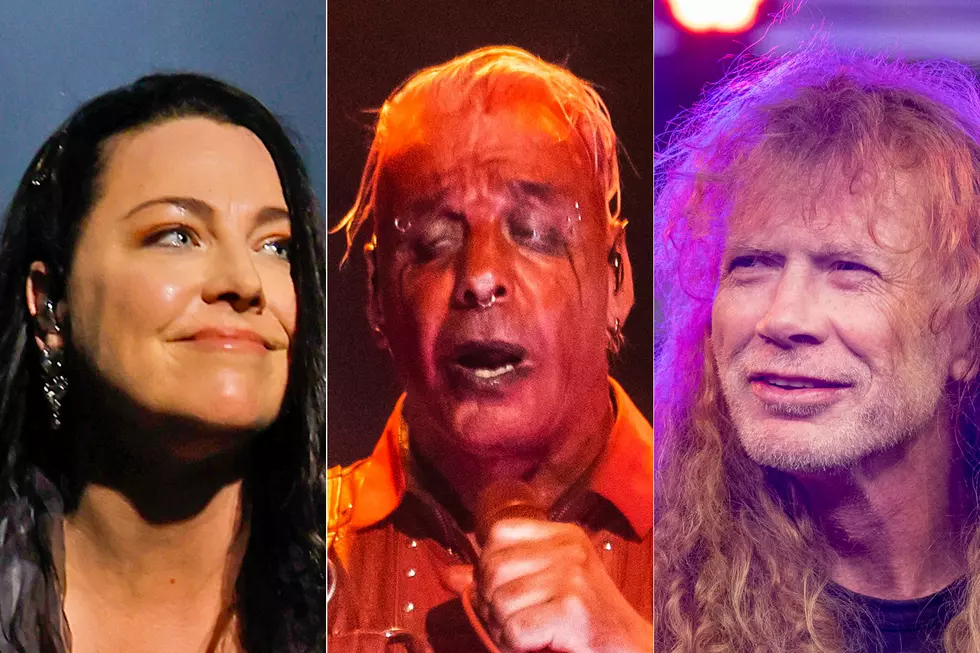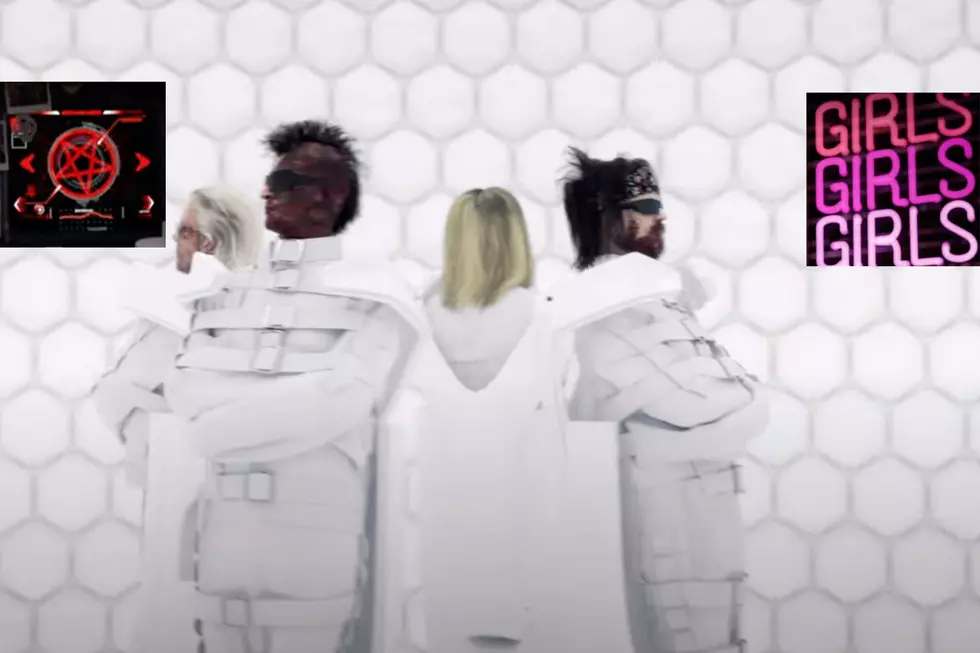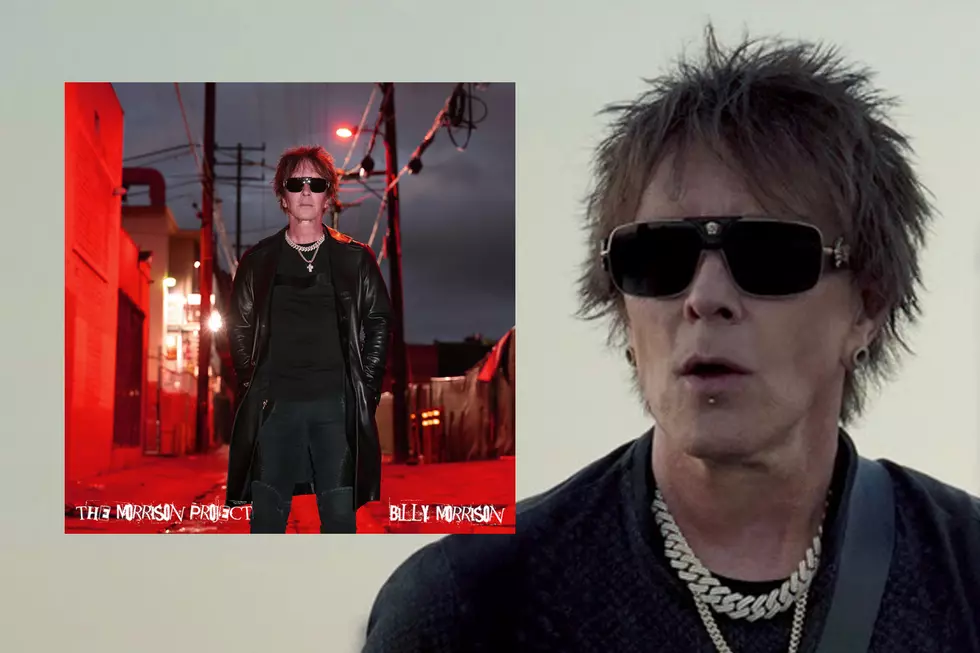
Meet Howard Benson, The Producer Making Your Favorite Bands Hit Machines
Halestorm's The Strange Case Of..., My Chemical Romance's Three Cheers for Sweet Revenge, Papa Roach's Getting Away With Murder, Motorhead's Bastards, Theory of a Deadman's Scars & Souvenirs, Three Days Grace's One-X, P.O.D.'s Satellite, Less Than Jake's Hello Rockview — you've probably bought these albums, and the words to the smash hits off them are forever imprinted in your memory, but do you recognize the name Howard Benson -- the producer responsible for helping these bands and a lot more sell over 40 million albums worldwide?
Benson's career as one of rock's most successful producers started off as anything but. Growing up in Philadelphia, he heard The Doors at age 12. Enchanted by Ray Manzarek and his chilling keyboard melodies, his ambitions to follow in the footsteps of his newfound idol sprouted quickly. His mom was a music teacher, so you could say it was pre-destined of sorts, that Benson would find a career in music in some capacity. Despite playing in "a million bands" in his youth, he turned his attention toward Drexel University as he transitioned into adulthood, pursuing a materials engineering degree. That's right — the ol' fallback plan. Take note, aspiring rockers.
Degree in hand, he landed a job in Los Angeles at Air Research, part of the Garrett Corporation. After starting off working in automotive turbines, he moved up within the company rather fast, working in mechanical systems in four years time. By the way, we're talking military aircraft here. Steady promotions and a good salary still couldn't sway Benson's true desires for much longer. Still active in the music scene, his band secured a demo deal and entered the studio with a "famous producer," but Benson was deemed "unproducible" after two weeks, leading him to believe he could do the job just fine himself. This was the incendiary spark he needed as he had already produced demos for other bands and he made the decision to leave his cushy engineering job in pursuit of the unknown — a career in music production, which would begin in 1986 with Long Beach punk rockers T.S.O.L.'s Revenge.
"Was I scared? Yeah. I was petrified," Benson testifies in our interview, but with some support from his parents, he made the leap. "I remember waking up the Monday morning after I got let go and not having anything to do and I remember thinking how weird that was. I remember laying in bed, looking at the ceiling, going, 'Wow, this is it - I'm going to remember this moment.' And I did. I remembered it forever."
And this is where the rest of our conversation unfolds.
What's always fascinated me about the role of a producer is balancing your own creative vision with what the band wants. You're very hands-on with bands and with arrangements and songwriting. Can you tell me about that dynamic and how that works?
This comes from a lot of experience of fucking up sessions, but one thing I did learn is you still have to be the man in the studio. I learned that from Keith Olsen, one of the great rock producers. You have to be able to point to your successes because bands are not going to just trust you, just because you're a good musician. The band may not say this but they want to have hits, but they want success.
"When we wrote and recorded 'Getting Away With Murder' and 'The Paramour Sessions,' Howard Benson was the perfect producer for me as a vocalist. He pushed me to my limits. He always knew how to get the best out of me. He wasn’t easy on me at all. There were moments of great tension between us because he knew my potential and he wouldn’t settle unless it was the best I could do. I learned a lot from Howard during those two albums and I’ve carried those experiences with me through the years. He is truly one of the great rock producers of our time." — Jacoby Shaddix, Papa Roach
My job is to make it their record, not my record but make it the best they can be. It's more about the details and not the big picture. [Some producers] spend hours editing drums, but to me, I'm like, “Hey is this song any good or not?” That's the end, that's it. When I did all of my hair band records and all that stuff, I was really focused on everything else because the bands sold me on it. My wife would always say to me, your songs aren't any good and I'm like, yeah but doesn't matter you know, the guitars are awesome and the drums are awesome and it sounds great. But it wasn't selling any records.
I finally put the pieces together on Less Than Jake’s record Hello Rockview, which is my first sort of mid-level selling record. We were just focused on material and we didn't care what Less Than Jake thought. Let's just get the material right and the vocals. So, that became my trademark.
I recently finished Martin Popoff’s book on Whitesnake. In there, A&R man John Kalodner talked about Blue Murder and said the reason they didn't blow up was because John Sykes was a guitar god, but not a powerhouse singer. He said the winning formula for hit rock groups was that combination of the two.
Today it seems like there's a lack of distinct iconic guitarists. Is this how you're making up for that one/two punch by making sure that the vocals drive the whole song?
There are no iconic guitar players out there, but [that’s] because the bands are not great yet. I read a Van Halen book which focuses mostly on David Lee Roth and how without David Lee Roth, there is no Van Halen. You've got a couple of guys in plaid shirts playing shows with their back turned to the audience. That's what you've got before he gets there. Greta Van Fleet are something that's starting to [take off]. Joyous Wolf [a band I’m working with]… if that band becomes bigger and bigger, I think their guitar player will become more iconic. Rising sea floats all boats. I see plenty of kids, by the way, who play great guitar, they're just not in a good band.
There's the idea that you have to be able to replicate a song live and if you can't, you shouldn't record it in a way that doesn't allow this. What can you say about the balance of writing and recording in the studio versus the expectation of what this material has to sound like when it hits the stage with touring being the greatest commodity right now?
That’s happened to me and I learned that a lot of bands run lots of tracks. I thought to myself, okay if I'm purest, I'm not running tracks, but if I'm a businessman and I want to make my bands happy, I'm running tracks you know? New bands, especially, can't use them because they can't afford to use them. But the big bands, yeah man, you're running stuff. First of all, nobody cares. The audience just wants to have fun. I personally think you should run the tracks unless you are unbelievably good at running around the stage and breathing at the same time and you're like a triathlon athlete, but most of these singers can't do it.
Let's talk about Pro Tools since we're on this thread of studio versus recreating everything. You worked on Sepultura's Against and then Less Than Jake's Hello Rockview, which you considered one of the first true Pro Tools records. Does this help you as far as guiding a band with arrangements? You have the ability to play God, cutting and pasting sections...
It's all different now. It was like that probably up until about six years ago. I used to play God way more. What happened was it's started to become super affordable now. The bands literally build their own tracks and make their own demos. A lot of bands are really good at this stuff. What they're really not good at, again, is the bigger picture, If you're sitting around doing the guitar sounds as a band, when are you writing the song?
When you're looking for the radio single, what's the one thing you have to get for a hit single?
Simplicity. Usually, I'm looking for something that you could put on a t-shirt.
So you’re talking about lyrics?
I'm a real lyric person. I mean, melodies to me are hooks, but lyrics are why people buy records. They may not necessarily understand that, but when a band or artist says something that you believe in that they share emotion with you. We're selling feelings here.
I tend to cry a lot when I hear things that make me feel something, I get teary-eyed or I get really excited because it's, "Oh my God, that's amazing." You're just looking for something that is very commonplace but said in a way that hasn't been said before. That's hard to do, but I always like the Fred Dursts [that are out there]. He's not going to be in the Songwriters' Hall of Fame or something, but I remember when I heard "Nookie" and I though, "Oh my God, this guy has figured it out." He could say one line and sell tons of records because everybody gets it and he didn't say it in the same way.
"We did four records with Howard which says a lot. He’s a master at what he does and is never shy about coming up with new ideas outside the box. He has created his own unique sound that has been imprinted on the rock community for the last 20 years making some of the greatest rock records in that time. Over the years he’s taught me a lot and I’m proud to call him my friend.” - Tyler Connolly, Theory of a Deadman
That happened with Theory of a Deadman when we did "Bad Girlfriend.” The opening line of the song was written by [Tyler's] wife, ex-wife, Christine Connolly, by the way. The opening life is, "My girlfriend's a dick magnet, my girlfriend's gotta have it."
I just thought it was so cheesy and I went to their show a year later after that song was all over the radio. That song comes on, girls start jumping on the shoulders of their boyfriends and pulling their tops up — who would have thought? So, the next year we're doing their record and we do a song, "Bitch Came Back." Nobody bought it. Why? Because no girl wants to be the bitch that came back.
Shifting towards the current rock landscape, there's been this huge acceptance of harsh sounds in mainstream music. You look at Linkin Park's Hybrid Theory - I've got to think that's the only Diamond-selling album with screaming on it. Do you think that these harsher sounds are also responsible for a little bit of the decline in the popularity of rock? It would appear there's a ceiling for how many people can tolerate that type of aggression.
I have one band where we have to go back in and get rid of the screams on a bunch of stuff because of radio. We can't get daytime airplay with screaming. Sometimes that's a decision the bands have to make and some bands make the decision just to scream.
Years ago I had a meeting with Dave Matthews. He goes, "I'm not interested in making hits for my record." I asked, "Well why?" He goes, "Because I'm going to lose my audience. I have my audience, I'm going to keep my audience. I make a lot of money from my audience — I don't want any hit songs anymore, they're going to screw up my career. I tried that last time and lost some fans."
So, this is what goes through the minds of artists. Do you take the risk of going more poppy and more commercial and if you miss, it's a bigger miss than not doing it at all. But, if you don't miss, it's a huge win.
Now let's get your success with My Chemical Romance. I read that you reached out to them to produce Three Cheers for Sweet Revenge. What did you hear on their first album that made you go, "I need to produce that band and turn them into the biggest thing that the scene has seen?"
I credit my manager at the time. She told me about them and said, "You have to take a meeting with this band." I listened to their first record for about 10 seconds and thought, "This stuff sucks," but then Gerard [Way, singer] sat down in front of me. This is 2004 and I already had three-to-four years of hits and at that point I had figured out what a star looks like and feels like. I thought to myself, "This kid is a friggin star."
I said, "Gerard, how much do you care about the 300 or 400 fans you have now? Or do you really care about 300 or 400 million fans? Which one is it?" He said, "I want to be huge." I looked at him and said, "We can do business."
We worked for a month really fleshing out songs. Craig Aaronson [A&R executive who signed MCR] calls me up one day and says, "I still don't think we have the hit song. At the end of this cassette [Gerard] gave me, there's this one part..." He plays me this lyric and it's Gerard by himself going, "I'm not okay, I'm really not okay." I said, "Craig, there it is. That's it. That's the whole project. We just need a song to put around that." Gerard had so much talent beyond just being a singer. He could visualize the material. That's why his lyrics were so good.
You produced some Motorhead albums in the '90s. Lemmy was known for just turning the amps on, you write a song, you take ten minutes to write lyrics and you move on to the next one. What was your experience like with him as far as the writing process went?
"I always have very fond memories of working with Howard. Musically, he knew his shit and had a great sense of humor. We made him wear a blonde wig for a week at some point and the verbal abuse between the band and him was first class. Everything was about the music, though - the tones, the arrangements and the performances. One day, I got sent to Reinhold Bogner's house by him to borrow one of the few Bogner Ecstacy amps in Los Angeles at the time. Electric drills were used instead of plectrums on guitars.... tiny little amps were mic'ed up in cupboards... it was really creative and special when we made 'Bastards' together. This in my opinion is the finest Motorhead album. It's brutal and beautiful. After falling asleep recording the solo to 'Don't Let Daddy Kiss Me,' Howard woke me with a tap on the shoulder and said, 'That was great Phil.' He also introduced me to Nashville tuning which I also used on that song. Saying that, the other three albums we made together were also fantastic — he definitely got the best out of us... he was a cunt!" -Phil Campbell, Motorhead
When I did was Bastards I didn't have a lot of work. I had just gone through the hair band era and all producers like me became extinct. Their manager, Todd Singerman, called me up and he said, "Lemmy wants to work with you." It wasn't complicated on Lemmy's part, by the way — he either wanted to work with you or he didn't, so there was no auditioning.
I went down to rehearsal and I did pre-production with him, which he had never really done before. So he didn't know what we were doing. I'm just like, "Well we're rehearsing." What really sucks is that I have all this shit on a DAT somewhere and I can't find it.
I spent a lot of time with him on his vocals. I loved the way he sang. He was so original the way he did things. On the other hand, he was insane. I actually ended up in North Hollywood Hospital from exhaustion. I ended up passing out at the console and then I woke up at North Hollywood Hospital because we stayed up for almost like, I don't know, it was four straight days doing all kinds of drugs and [being] awake, and I was just trying to stay awake so, I just couldn't stay awake any longer and I tried...
For Lemmy four days up was the standard, right?
It got sticky in there. I fought him hard on things, especially on "Born to Raise Hell" and songs that I wanted the way I wanted. It was also in that movie Airheads.
I know it's unbelievably tough to get started — there's schools with recording programs and entire classes are graduating with the same skill set every year. What advice do you have for someone who is genuinely serious about a career in producing?
"I really loved working with Howard. I really like talking with him and he’s a really smart guy who knows his stuff musically. He’s not a one dimensional person. Some people have one speed or one thing that they’ll talk about and that’s kind of it. Howard’s a really smart, cool dude and in my opinion, he got some of the best performances out of me that I’ve ever done on the Madness record, so I’ve got nothing but good stuff to say about Howard." -Phil Labonte, All That Remains
My career has only moved forward for one reason: when I got to recognize talent. I would say if you are a young producer, find talent, make your demos and put out music with great talent. If you can't recognize talent, then you're never going to be a great producer. It's just not going to happen.
Thanks to Howard Benson for the interview. Follow him on Facebook to stay up to date with everything he's doing, including his new STL Tonality plug-in which you can learn more about here.
20 Best Selling Hard Rock + Metal Albums in the United States
More From Loudwire
